#so it's not the most coherent
Text
i think one of the things the pjo show has understood the best so far is specifically the isolation and insecurities that come with being neurodivergent, and how it reflects onto percy. the book touches on it a lot, but i think rick really wanted to push percy's own internal struggles more obviously to the forefront for the show.
Percy references again and again how inattentive and zoned out he is constantly, and how he blames himself for being stuck in his own world. He feels crazy and misjudged by everyone around him just for having what everyone else presumes is a very active imagination, hyperactivity, and a brain that works differently. and when people do acknowledge his differences, even attempting to spin them positively to him, like Sally and "Mr. Brunner," it only makes him feel worse, because again the only thing they can tell him is that he's "special," inherently other, something he's come to associate with being an embarrassing and shameful thing, with Nancy calling him "special" as an insult. I've seen "special" thrown at nd kids as an insult by their peers over and over again since I was little. So Percy can't help but believe it's a negative thing, no matter what the adults that do support him in his life try to tell him, because it's been internalized that he's just different in a way that's bad and inferior, and that that there's a reason he's lonely and troubled and delinquent. Even if it was a positive thing, like Sally and "Mr. Brunner" insist to him, he feels inherently isolated and confused and wrong in the mortal world for being different, and like there's nothing that can change that or make him normal.
We see Percy break down in front of Sally after being expelled about how he's terrified something's irrevocably wrong inside him now. And his immediate reaction of rage and confusion when the only thing she can tell him, once again, is that he's special. And I think that is really going to resonate with a generation of nd people who've experienced these types of scenarios.
#this isn't the most eloquently spoken thought ive had lmao#but i wanted to get out some thoughts that have been brewing in the back of my head since i finished the episodes#so hopefully this makes semi-coherent sense and isnt just a lot of nothing#percy jackson#pjo#pjo series#percy jackson and the olympians#percy jackson show#percy jackson tv show#percy jackson disney+#sally jackson#annabeth chase#percabeth
3K notes
·
View notes
Text
that ivan loves till is the most obvious thing about them
but. does ivan know that…?
the ivan that regards his own feelings as shallow, the ivan that learned how emotions are expressed only from copying others… does he even know that the love he’s felt for so long is love?
probably not. and part of the reason is the one he loves himself
because the easiest example he has of love is till's feelings to mizi. till outright calls it love, and ivan watches him so much he has to be aware of this
and till’s love to mizi is totally unselfish, right. he doesn’t seem to actually want much from her—just that she's still there and still "mizi"
but ivan can't be satisfied with just watching
he… wants. ivan wants till’s attention, till’s affection—
surely this selfish wanting can’t be love
...no wonder he was never able to express his feelings straightforwardly when he belittles them so much
but he can’t stand not having anything either, so he does… whatever he does instead to get any scraps of attention he can, from someone he's convinced doesn't care about him at all
only showing affection when till can't see it, right until he knows he's going to die
but ivan's feelings for till are all he still has of himself... to think of them as shallow...

I've seen this translated as "I should've been kinder" to him (till) or to her (sua)
but really, the one he should've been kinder to was himself
#alien stage#alnst#alnst ivan#ivantill#i have a lot of thoughts on till -> mizi too but this is long enough#just attempting to rewrite my twt rambles more coherently#idk why i wrote this so dramatically tho...#'thank you for being the victim of my shallow emotions' is going to haunt me to my grave#ivan's character is just a careful balance between his natural freak nature and his extreme depths of self-loathing#making him the most miserable guy ever#...really once you realize so much of what went wrong is thanks to ivan just hating himself too much to even think of them as friends. well#c...can we bring him back... don't die like this.....#(also you know. with the implications of how 'pets' are treated#wanting someone physically must feel... even more wrong
583 notes
·
View notes
Text
I'm willing to bet that the Lords In Black knew exactly what they were doing with that deal, and that it worked out exactly how they wanted it. I don't think they ever really wanted Steph or Pete to kill eachother, or at least I think they knew that they would never do it. I think they wanted it to be Grace all along, they knew she'd most willingly make her sacrifice because they knew that deep down she wanted to. They also knew how she'd react once she got a taste of their power. They knew that she'd want to, need to, keep using it. What would getting Steph or Pete to kill the other accomplish in the long term? Nothing. But the way everything worked out, the Lords In Black now have someone willing to repeatedly call upon their power, repeatedly let them mess with stuff in the human world. And I think that's exactly what they wanted.
#so far the most coherent thought I've had about the show#nerdy prudes must die#npmd#npmd spoilers#hatchetfield
673 notes
·
View notes
Text
okay I've finished making my big spreadsheet of how mp100 characters refer to each other! some thoughts on this under the cut because it got long
the Kageyama brothers are very polite in how they refer to people. their parents must have really instilled etiquette into them bc no one else is as consistent about using polite honorifics/titles as they are. the only people Mob doesn't give an honorific/title are his brother and Dimple, and the only people Ritsu doesn't give an honorific are Dimple and Shou, who he just calls "Suzuki"
Reigen, on the other hand, is pretty inconsistent and casual with his use of honorifics. he says "Mob-kun" a couple times and "Ritsu-kun" once, but usually they're just Mob and Ritsu (or "Mob's brother" lmao). the only honorific he consistently uses is "Tome-chan"
it's infrequent, but both Reigen and Dimple refer to Mob as "my boy" at some point :') he's their boy!
Ritsu doesn't refer to the Awakening Lab kids at all until he asks their names after being kidnapped lmao the only exception is when he calls out to the older Shiratori brother after the younger one is taken away and he calls him "Shiratori-kun." considering the fact that after asking their names, he refers to both of them as Daichi-kun and Kaito-kun, I think there was absolutely a moment when everyone was freaking out about the Shiratori brothers where he was like "ohhhhh that's his name"
also he switches from "Onigawara-san" to "Onigawara-senpai" when he realizes he's friends with his brother lmao fakeass
even though Mob starts calling Teru "Hanazawa-kun" as soon as they exchange names, Teru doesn't give him the honorific until they decide to raid Claw together. I guess that's the point when he decides they're friendly enough for it? he calls Ritsu "brother-kun" as soon as he realizes they're related and never refers to him by his actual name
everyone calls Teru some variation on his nickname EXCEPT Mob and Dimple. Dimple actually only calls him "brat" and "that guy" for a while until he managed to track him down again during the alleyway incident, which I realized is because he was exorcised before learning Teru's name lskdjflkdsf from the Seventh Division arc onwards, he just calls him "Hanazawa"
I love that Dimple tries to refer to the brothers with cutesy nicknames and both of them are like "if you do that again I'm killing you all the way dead" and he's like "understood." and then refers to them by given name from then on lmao
Teru refers to Dimple as "Dimple-kun" and Tome calls him "Dimple-chan," both of which are SO funny to me because he's way older than them. rude as hell, this evil spirit deserves no respect
Shou doesn't use honorifics or titles for ANYONE. Ritsu is just Ritsu, the Ultimate 5 are all their last names, his dad is just Pops. he also exclusively refers to Mob as "Ritsu's brother" dkfjldskfj
Serizawa alternates between "Shigeo-kun" and "Kageyama-kun" with no real rhyme or reason to it. just seems to depend on his mood I guess
#mp100#this was fun I liked making it!!#the kageyama boys are so polite#I have some Thoughts about shou being the only one ritsu doesn't give an honorific#I wonder if I can wrangle those thoughts into a coherent post#teru definitely knows ritsu's name so I think calling him brother-kun is just an affectionate thing#or he can't call them BOTH kageyama(-kun) and he doesn't want to call him by his given name#ritsu always calls him teru-san which I think is sweet bc he's the only person ritsu refers to by a nickname#everyone else is always last name#shou on the other hand. I don't think he knew mob's name for most of the manga sdlkjfkldsjf#I don't think he learns mob's name until the confession arc and even then he still calls him ritsu's brother#which is hilarious to me#mob never refers to him by name but I think it's a safe bet that he'd call him suzuki-kun#based on how mob refers to most other people his age/younger#uhhhhh what else#dimple fucking HATES that tome calls him dimple-chan#he complains about it repeatedly in the reigen spinoff sldkjfkldsjf
2K notes
·
View notes
Text
I think what particularly annoys me with the "zelda was always gameplay before story" is that... it's not true? At least I don't think it's true in the way people mean it.
Zelda games were always kind of integrating story based on the standards of the time. When game stories were in game pamphlets, Zelda's stories was in the pamphlets. ALTTP tried to tell a pretty complicated stories with the limitations of the time. OoT was actively trying to tell an epic, cinematic tale packed with ambiance and expand what 3D could offer that 2D games struggled with. Majora's Mask is deeply character-driven in many, many ways. Wind Waker and Twilight Princess are both pretty concerned about their stories, down to the point that some people were bored by TP's cutscenes in particular. Skyward Sword, from what little I have played it, is very very invested in its characters and their journey (and 2D Zeldas have Link's Awakening, Minish Cap... None of them are visual novels, but they are concerned with emotional journeys, character arcs, mysteries about their own world...)
What is true is that the narrative wraps around the mechanics, and not the other way around. The mechanics drive themes, aesthetics, emotional beats and character journeys; and that's great. The world is a puzzle, and the world is delightfully absurd when it needs to be, full of heart when it calls for it, dark and oppressive when it suits the player experience.
That does not mean the games aren't invested in their stories. Even BotW has a pretty complicated story to tell about an entire world rather than one specific tale or legend --all of it at the service of the gameplay, which is exploration and mastery of your environment.
So. Yes, none of the Zelda games are million-words long visual novels that care deeply about consistency and nuance; but stories don't need consistency or deep lore to be meaningful and serve an emotional journey. Again: gameplay is story. The two cannot be so easily parsed from each other.
And Zelda as a franchise obviously care deeply about story, characters and setting (and still does right now --otherwise there wouldn't be a movie), even if it doesn't try to imitate prestige narrative-driven games, which is great and part of why I love this series so much. Doesn't mean it couldn't have done better in the past, it obviously could have, but I feel like pretending that nobody ever cared about story or character is just... false? It's a huge disservice to the devs too. Some of them obviously cared immensely.
The "gameplay above story", at least in the extent to which it is paraded today to defend TotK, mostly, is a really recent development. And I think it's one that deserves to receive some pushback.
#thoughts#tloz#zelda#the legend of zelda#totk critical#(sort of)#(I mean this is the subtext)#guys in 1998 nintendo was trying its darnest to make an epic story (with uhhh the writing that it got)#(love that game to bits but won't defend the actual writing)#the fully gameplay-driven game was mario 64!!!#I think this perception is also partially the fault of that “narrative game” category that is just.... kind of like Prestige TV but for gam#as if most games don't have some form of storytelling within them#and that coherence and vision and consistency are part of game design too#and will hurt a game's enjoyment if not handled correctly#a really really paired back narrative game is really difficult to pull off actually!#because you still need stakes and some degree of intrigue#so you need to figure out how to introduce this without walls of text and is it narrative design? is it game design? it's both!!#anyway anyway
443 notes
·
View notes
Text
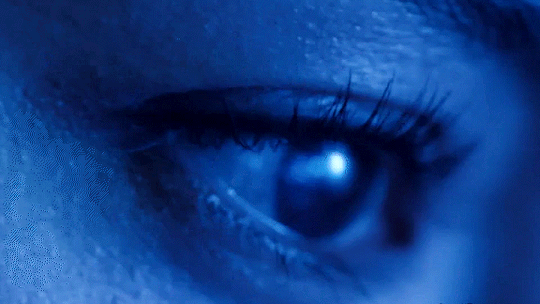
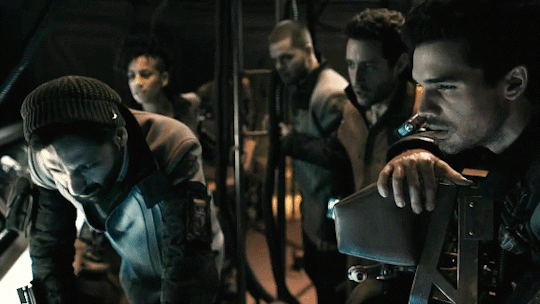
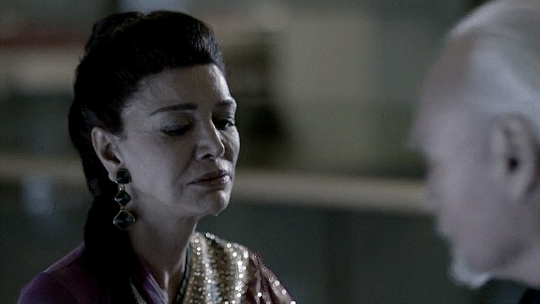




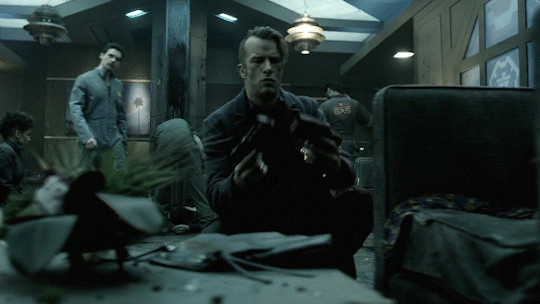
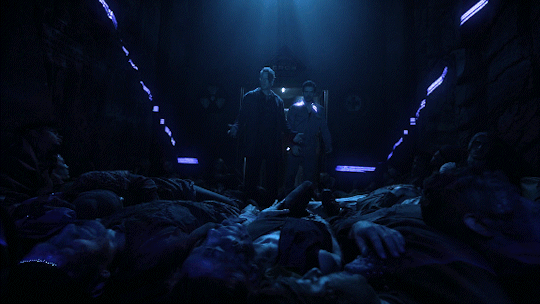
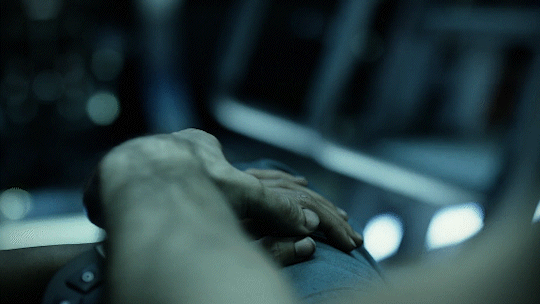
The Expanse | Season 1 (2015-16), Mark Fergus and Hawk Ostby
#the expanse#theexpanseedit#aaaah i missed my space babies so much!#excellent first season#so much foreshadowing is unreal!#knowing what comes next most of this season felt like an introduction#also i realized how much i forgot and how far apart the season were from one another#and i can't wait to have a coherent idea of the whole show watching them back to back#tv 2024#i made this#i just want a tag for the things i personally put out into the world
285 notes
·
View notes
Text
LRB but I'm replaying BG3 and Gale being on the knife's edge of Wholesome/"Dirty" is what makes him soo interesting to me. Like this is a man who, in two different versions of the same scene, can either sweetly and gently make love to your tav in a typical setting which transitions to a tasteful fade-to-black, or brings your tav's spirit along for a transcendent experience where he literally duplicates part of himself so he can have more parts to touch their parts in some crazy astral-soup sky world. And both are treated like valid expressions of his love!! Like the range they allowed him to express, he's not one or the other, he's both
#sorry it's 4 in the morning and i literally don't think I've ever encountered a character like Gale Dekarios#so i'm not articulating this as coherently as I'd like but you get the idea#there's other examples not relating to his romance throughout the game but his romance is what strikes me most#i think it's also why a lot of Hozier songs fit really well with him#it's that “my love for you is so powerful that it transcends words so we fuck nasty style” vibe#bg3#marie speaks#gale of waterdeep#edit: not me spotting a typo after this post has already circulated....#i meant LRB as in “last reblog” and not LBR as in “let's be real” 💀
233 notes
·
View notes
Text
OKAY who wants to hear about why i think nimona challenges amatonormativity? you do! 🫵
one of the main ways this is accomplished is through ballister and ambrosius’s relationship. it’s arguable that it doesn’t necessarily fit the traditional model of romance - not only are they a queer interracial couple, and not only is their relationship ambiguous in the book, but there are certain instances, especially in the movie, that subvert traditional ideas of romance and friendship.
one instance that really stands out to me is when the director asks ambrosius what’s on his mind and he goes on his imagined rant about how arm-chopping isn’t a love language - you know the one. when he mentions ballister, he refers to him as “the man i love, my best friend.” and not just one or the other, but both! the man i love, and my best friend. he places equal emphasis on both the romantic and platonic aspects of the relationship, valuing ballister in both a romantic context and a platonic context without treating either one as more important than the other.
and even moments such as the first “i love you” and the kiss manage to subvert tradition. both of these things are generally seen as a pretty big deal, especially in fiction - if the characters are kissing or saying “i love you,” it’s usually a moment in which everything changes. a line is drawn, dividing the story into after and now. sometimes it’s dramatic and climactic, with fireworks and a swell of music, but even when it isn’t it’s still seen as a turning point of sorts. now it’s official, now it’s real. but this isn’t the case in nimona. both moments are certainly significant - they do a good job of showcasing the character development and where ballister and ambrosius are on their respective journeys, and are certainly important in terms of representation - but neither one follows the path that most fictional romance does.
another way in which nimona challenges amatonormativity would be the emphasis on friendship! in the tavern scene (in the movie) when ambrosius suggests killing nimona, ballister disagrees and says “she’s my friend.” ambrosius replies with “aren’t i more than that?”, implying he’s more important than a friend - thus upholding amatonormative ideas. ballister becomes angry at that and leaves - challenging this idea and prioritizing his platonic relationship with nimona over his romantic one with ambrosius, as nimona is the one he wants to defend.
additionally, a big part of this scene is the way ballister deliberately rejects institute values while ambrosius unintentionally upholds them. and because the story challenges homophobia and transphobia (and other forms of bigotry) through the lens of the institute, it would make sense for it to challenge amatonormativity too! it’s something that’s become incredibly normalized, to the point that lots of people don’t even know it exists, and this is reminiscent of the institute brainwashing, especially when it comes to ambrosius - he’s been manipulated his whole life and probably genuinely doesn’t understand the level to which he’s internalized institute beliefs.
ballister prioritizes nimona many times, actually. when he tells ambrosius she’s “smart, kind, and quite sophisticated,” when he’s overjoyed to see her again at the end, when he refuses to kill her and saves her instead. over and over, he proves how much he cares about her, even when this involves directly going against what ambrosius wants - which, of course, is really what the institute wants. a core tenant of amatonormativity is the false notion that romantic relationships are more important or valuable than other types of relationships, but ballister actively goes against this!
to conclude, as a story that at its core is about identity and challenging societal beliefs, nimona defies expectations and traditional ideas of what it should or shouldn’t be. it’s possible that amatonormativity wasn’t what the creators had in mind, but the story still manages to challenge it with grace and elegance. just like its main character, nimona refuses to conform to what others want it to be.
#nimona#nimona movie#ballister blackheart#ballister boldheart#ambrosius goldenloin#ballister x ambrosius#ambrosius x ballister#nimona netflix#nd stevenson#nimona spoilers#i could go on tbh but i think this is a digestible amount#often when i’m writing a meta i’ll walk around in circles talking into my phone recording my thoughts out loud#and then i’ll play it back and put the most coherent stuff into a list which eventually becomes paragraphs#and the combined recordings for this one are about half an hour in total lol#i’m just. absolutely in love with the whole story. both the book and the movie mean so incredibly much to me#changed my life shaped me as a person etc etc :’)#OH i almost forgot. this analysis is dedicated to the person who sent me aphobic anon hate about it before it even existed lol#i know i said i wouldn’t post anything if people couldn’t be normal but idc actually. seethe with rage! <3#my words#meta
940 notes
·
View notes
Text
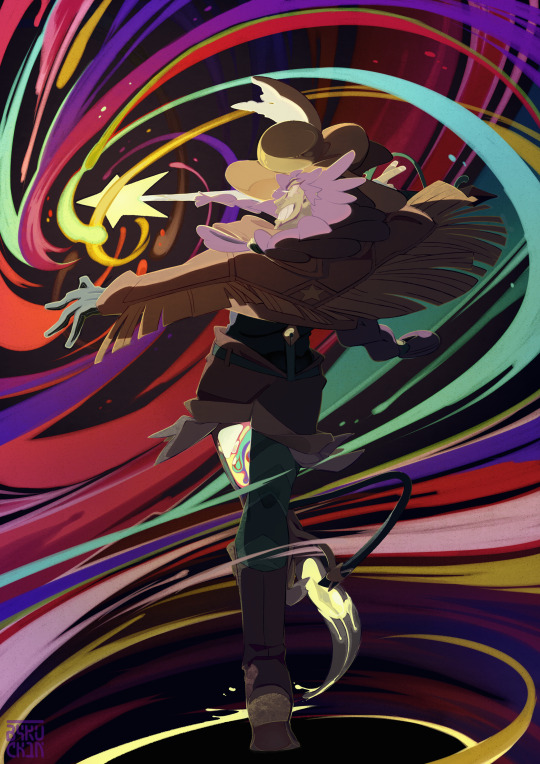
wizard of both ways
#pokemon#swsh#champion leon#wizard leon! Ive messed arounf with this piece for literal months#and like yesterday my brain was like okay either you finish this or you explode and die#so. been finishing this up#now I can return to work in peace....#this is! also a revision of an old design#which was kinda made up as I was goin so it wasnt the most coherent thing. but I was like well. its a wizard design#cowboy wizard... sword and pen..... being in two places at the same time..... this is what this wizard is about now#the number of wizard leons Ive got is still at a round ten rn I think. into this new year I'd like to shore up and make a zine for em#got a big to do list this year... hope I get to everything#but for now. we return to the good work. we live n we see#have a good day guys! I get a snack now. a botato jacket. I wish u the opportunity for the same
253 notes
·
View notes
Text
In the majority of the Httyd franchise Snotlout is trying so hard to be what he thinks people want from him. Which is why I love his development in rtte so much because he is always so scared of being unimportant to people but then he has to actually confront his deep fears and anxieties and reconcile with parts of himself he pretends doesn’t exist. And then he is able to see that he desires his own approval over the approval of others even if the two goals overlap occasionally. Then he is able to become the best version of himself and the best version of him is the one that is kindest to himself
#anyway not lout as an episode made me scream cry and throw up#I love Snotlout so much#his fears and anxieties are so relatable to me#and he prolly means the most to me out of all Httyd characters#but I literally adore all of them so much#how to train your dragon#httyd#rtte#snotlout jorgenson#httyd snotlout#hiccup haddock#hookfang#race to the edge#idk if any of that was coherent lol
552 notes
·
View notes
Text
also quite obsessed with karl being as detached from the story as he is. there's nothing that makes him have to be the detective that has to be involved, but he unknowingly dooms himself by agreeing to work with the KYAL cult. every other detective basically deals with elias head on except weissman, who only meets him right before he kills him. like he's right when he says "by my choices" because everything that leads him to being mixed up with the mannix cult is himself. it's the gambling debts and the choice to do the dirty work for an organisation he knows nothing about. he's the only one that doesn't encounter that body doing police work and it's specifically because he's told to cover it up. he gets himself into the mess and eventually fixes it but the fact that esther always dies in the doomed timelines and he's always too late even if he starts wanting to change things ("till this child. esther.") it just makes me very ill
#sorry jane who heard this on her dms but now im posting it to tumblr cause im having a category 5 woman moment. AND ALTERNATIVELY:#i am also EXTREMELY obsessed with how its a time loop and the idea (so sorry tumblr user whose post i have lost and was inspired by)#weissman was just so fucking hard to deal with that they made sure that he was in their pockets. i just like the idea of the loop--#--having like. fixed points that elias would need to ensure the dystopia (body is covered up/the investigation closes/etc) but#how they get there is a slightly slower process and the earliest loops were the messiest/most unpredictable#and what we see in the show itself is like. the most streamlined version over hundreds of loops and attempts#so karl specifically. lonely that he is and determined to survive. AND with a cruel streak against people he doesn't like#kept nearly blowing their operation so they began to incorporate him in it instead#there's also another tragedy in there if /esther/ is what they realise works best against him..#just love and kindness for a girl that weissman comes to see as family and they immediately exploit it after learning during an early loop#im ignoring specific plot points here (polly seemingly panicking when esther shows up at the station) but I DO NOT CARE.#THERE'S ANGST HAPPENING RN. IM CREATING SCENARIOS TO HURT ME#now if i could write coherently this would be written as a fic but im stuck writing too long textposts#karl weissman#bodies 2023#bodies netflix#sorry to the other detectives. weissman in particular is my babygirl who i devote most of my brainpower to#personal
191 notes
·
View notes
Text
I was going to be a superhero. That was the goal I used to calm myself down at moments like these. It was what I used to make myself get out of bed on a school day. It was a crazy dream that made things tolerable. It was something to look forward to, something to work towards.
i'm reminded again of what i was talking about here--taylor's obsession with being a superhero serves as a fantasy that if she takes up an alternate identity and does it Right then she can be valued as that alternate identity even if she isn't valued as taylor. the usage of "crazy dream" specifically is interesting because it's like. worm is very into meta-commentary on superhero genre conventions. it's extremely conventional in cape media for teenagers with shit lives to escape awful, boring reality via assuming alternate identities as superheroes, and earth bet textually contains its own cape media: capes marketed on lunchboxes or as dolls, teen hero capes sold as a sort of teen celebrity, etc. it's an interesting divergence from most cases of teenage characters escaping from Shit Reality via magic or supernatural circumstances because those circumstances are usually thrust upon said teenagers unexpectedly--like, "surprise, magic is real, and also you're special and involved in it now!" but here, taylor knows that superpowers are real, and she's actively being fed the dream of escaping from her Shit Life via the PRT's ubiquitous societal presentation of capes as popular and morally stand-out figures. cape media about the dream of escaping from Shit Teenage Life via being a superhero literally exists within the universe of worm, and taylor wants to believe in that dream. so we're already being set up to see the conflict btwn her belief in that dream and her realization as to the realities of caping within worm's universe. and i think it's a really fun bit of genre subversion/commentary that how capes usually work in the genre as a whole are not how they actually work in worm, but it Is how the prt Wants characters to believe that it's how capes work.
#wormtime 2#wormtime 2 arc 1#worm spoilers#this one isnt ordered the most coherently but im busy and tired so its what you get#we are now officially done with 1.1. onto 1.2#parahumans
184 notes
·
View notes
Text
I am going insane thinking about Forever and Philza for real for real. When I first saw them interacting I thought that getting atatched to these two would bring so much angst to lil old me but like they're one of the most solid friendships nowadays and it's so heartwarming to see that developing!
It's about how Forever saw Tallulah being attacked and killed right in front of him and the pain everyone went through when Bobby lost his last life and decided that no parent would go through that again. That his son would never be in that danger again.
It's about how they came suddenly into the island and quickly became an essencial part of everyone's life. I didn't follow Philza before but I can only imagine, like, there is that monster that is trying to kill your kids at any cost, just like the very island they were in. You couldn't trust the Federation and maybe you couldn't trust the others islanders too. Everything you had is your own strength and your intelligence and the determination to do anything you could to protect your kid, but in the end, the very act of fighting for their life could be the thing that kills them if in the heat of the battle they kids just get too close from your weapon.
That was the problem. And what could they do if not do their best to fight and get stronger and survive one more day?
Forever saw that. For me that is so crazy. He saw a problem that seemed like it didn't have a solution, like it was something that simply could not be helped and he just went 'nope' and made an entire system that took him hours and hours to not only protect his son, but the children of the entire island.
I just wonder if it was a breath of hope in the middle of that despair. I mean, of course everyone did a lot for the eggs, I could spend literal hours here describing how pretty much everyone in the island, in little or big ways, went out of their day/routine/plan to take care and spend time with their eggs, to wipe their tears or to just laugh and be silly together. This is also hope and this is also important. And the N.I.N.H.O? Bruh, it was the confirmation that even if the person wasn't good at fighting. Even if you weren't online. Even if someone was kilometers away from the fight, with just a button your kid would be safe and sound and far away from any attack.
And Forever gave that freely to everyone. I think that was The Moment to Philza. That crazy silly funny smart brazilian guy that followed him talking nonsense about love and an ex just saw all of their (and his too) pain and said "We're not going to go through that alone ever again."
The amount of care aaaaa. And now Philza gave him acesso to his base. To the place where his kids are and one of the places that he protects that most. And he never took it from Forever. NEVER. That is so crazy to me. I mean, picture with me:
That man is a full anarchist and not for a single moment he decided that Forever becoming the president is a reason to take him from his allow list. Not ever when he accepted the task from Cucorucho and everyone thought that he and the Federation were getting close.
Not even when Tallulah and Richas had that fight or during the entire Haply Pills Arc. !!!! Do you realize that! From the very first second that Philza decided to trust him he just Didn't Stop. Ever. Forever was going crazy smiling laughing and threatening everyone, refusing to listen about the eggs and he just said that Everything Would Be Okay, We're Going To Get Through This.
His enemy is the Federation and that blonde, crazy guy with a heart of gold is his friend, he is not going to steer away from his side. They flirt and make jokes and have serious conversations and Philza goes to him when he gets any important information and Forever asked about him every day since he woke up to thank him for not letting him alone. They could have the rockiest relationship ever but each time they see each other is so calm and fun and full of reassures that They Will Find The Eggs, Don't Worry, You Did Everything You Could.
Just. Them.
#Philza#Forever#I just have a lot of thoughts and most of them aren't very coherent vaugwywgwjeveygejeveheveyefhw#it's just so crazy like cagcwtwdw REALLY thought that they would just stop interacting after the Marriage Arc but NO THEY'RE STILL THERE#like B R U H#one of the happiest surprises ever I am just ahwceywaaaaaaa lot of feelings lot of feelings#for both romantic or friendship pairings I just really like their interactions jfssdchvugnb#maybe it will change in the future but who knows#just thinking a whole lot#qsmp
209 notes
·
View notes
Text
skip and loafer chapter 55 thoughts
this chapter was so poignant but one aspect that stood out to me was all it told us about mika & mukai's dynamic so far!

mukai followed along on a whim & subsequently ended up witnessing a lot of vulnerability on mika's end, someone who he still doesn't have a good grasp on yet—after seeing her worst + being surprised by her capacity for kindness, his perception of her is continually being challenged & muddled. we've seen already how mukai is a very logical, cut & dry person in his thinking, so imo mika's Layers are both confusing & intriguing to him.
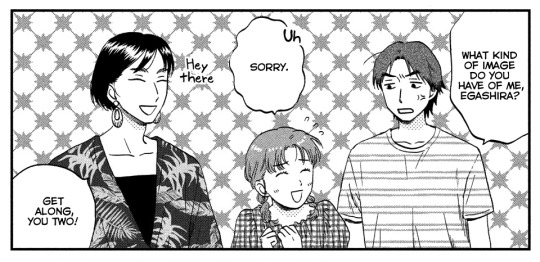
at the same time i thought it was interesting how mukai realizes that mika ALSO doesn't have a clear perception of him—though their scenes always feel very Intentional, they actually have not interacted a ton within the context of the friend group, esp given their rocky start.

so from there, we get this juxtaposition within mika & mukai's relationship where they are v unsure of each other and yet there's an odd sense of trust there. it's definitely not an ACTIVE trust, but something more peripheral; mika doesn't mind mukai being there while she talks to nao because, in her mind, mukai already knows abt this insecurity so she isn't revealing anything new to him. after opening up to nao, she apologizes to mukai for getting him caught up in her venting; despite this, it really struck me how this felt like such growth for her to simply move on rather than carrying the feeling around shamefully. it's like a weight lifts off mika's shoulders & it's cathartic for this to happen in front of mukai, who was the accidental catalyst for her confession to shima. mukai, in contrast, seems more unsure than ever.
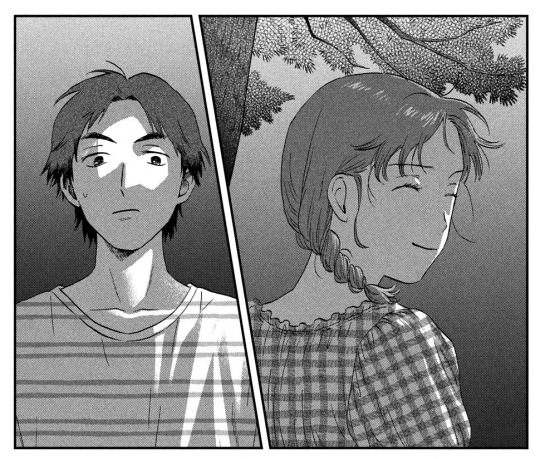
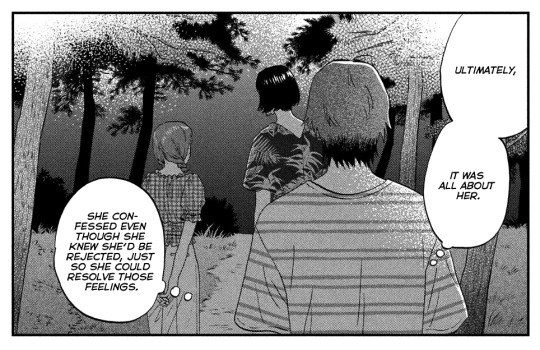
he's puzzled to realize that mika's confession to shima wasn't fueled by a desire for reciprocation but rather the courage it took her to express her feelings openly, instead of always attempting to hide behind a facade & never experience the vulnerability in risking rejection. we know that mukai's experience of romantic confessions is almost entirely filtered through shima, since he's never been confessed to himself—and it's interesting how mika's confession to shima directly flies in the face of how negatively shima feels about being confessed to.
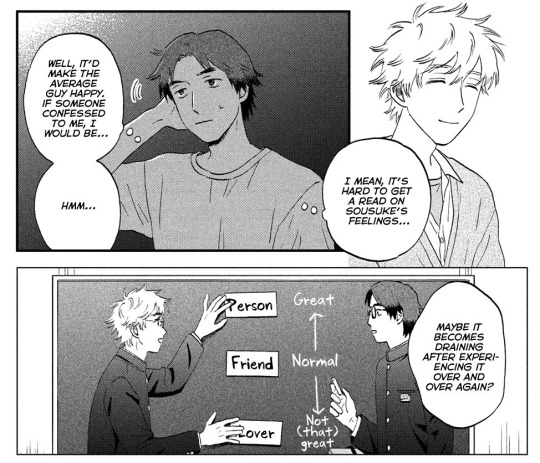
for shima, girls confessing to him has always been a sign of what's expected of him, people wanting something specific FROM him rather than liking him as a person—now that mukai knows how drained that makes shima feel, it's interesting that he learns mika's reasons for confessing & how they're entirely different, motivated by a desire to be brave rather than expecting something of the other person. nevertheless, this leaves mukai with a lot of conflicting thoughts in his head about how a confession should make you feel. again, he's very logical, so the ambiguity is confusing to him! (and all of us honestly)
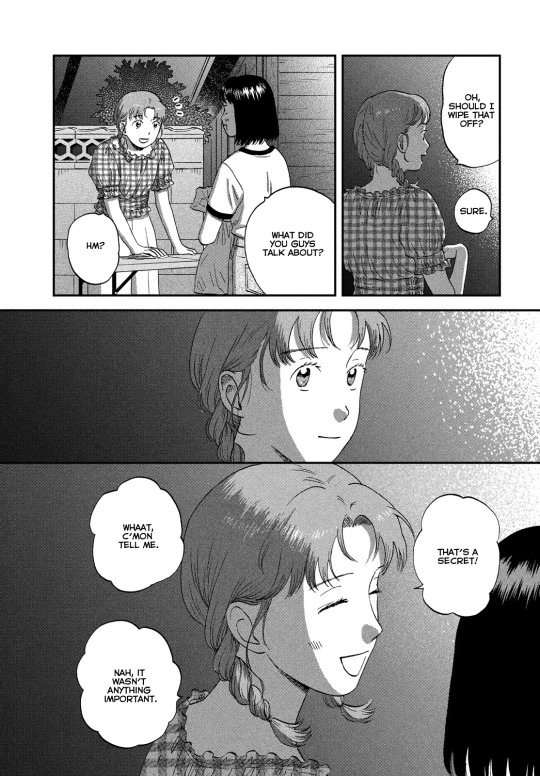
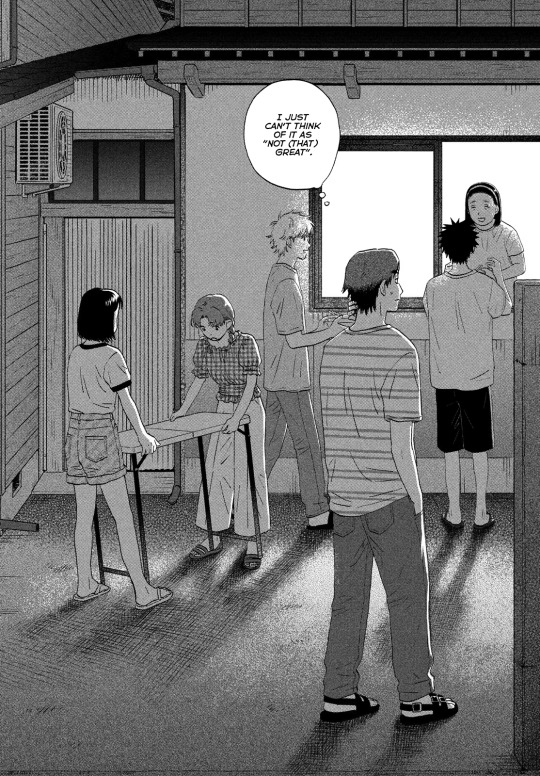
but then, back at the house, we see mika through mukai's point of view—she shoots him a look!—at which point he decides that he couldn't think of being confessed to as "not that great." i'm just gonna let that sit there :)
so with that!! i loooooved all this chapter gave us to work with in the development of these characters, esp mika & mukai's dynamic!!!! with a character like mukai who spends so much time as an observer, it's so fun to see him start to actually reflect on his own point of view within the story, like he feels himself going from being the background character in everyone's lives to really developing his own outlook—and it's all thanks to girl of all time mika egashira who inspires EVERYONE to think nine million thoughts trying to understand her.
#skip and loafer#sukirofa#mika egashira#mukai tsukasa#mikamukai#tagging for before they get famous#this chapter had such powerful moments w nao chan and mika so ofc i was a mess reading that and then mukai thoughts were my most coherent#my meta#skip and loafer meta#zoe.txt
241 notes
·
View notes
Text
a ramble about arthur's relationship with dutch and hosea
haven't used tumblr in a while (let alone made an actual original post in who knows how long) but i can't stop thinking about that one interaction between dutch and arthur in lakay. specifically: "you sound like hosea." it breaks my heart, because dutch is right in saying that. as chapter six unfolds into the tragedy it is, arthur becomes more and more like hosea, and just like hosea, arthur tries and tries and fails to get dutch, stubborn and single-minded, to see reason.
one of my favourite journal entries, is where arthur says, "i love dutch like a father, but in many ways i love hosea more." arthur loved hosea. hosea saw arthur for who he was. knew arthur wasn't near as dumb as he liked to pretend he was. one of my favourite interactions between arthur and hosea is early on in chapter 3, very shortly after they get to clemens point. arthur walks by hosea sitting at a table, who calls out to arthur and asks what he thinks about dutch's plans. arthur's response is "you know me, i never did much thinking." to which which hosea says one of my favourite lines in the game, and it's a line that gives far more insight into arthur, hosea and their dynamic than you might first think.
dutch was arthur's father in a more abstract way. whether it was dutch's intention or not (and i believe, at the very least, it was later on), i always found his "you're like a son to me" comments to arthur to be very manipulative in nature, meant to reel arthur back in when he's concerned he's "getting away," so to speak. i have personal experience with men trying to get me on their good side by saying i'm like a kid to them, and maybe i'm projecting a little because of that, but the way dutch says that to arthur triggers the same alarm bells in my brain.
again: "i love dutch like a father, but in many ways, i love hosea more." say what you want, but hosea was arthur's true dad. he was his dad in all the ways that mattered. hosea knew arthur so well, he knew arthur was putting on "an angry moron act." in the video i linked, he sounds genuinely frustrated when he continues saying "but it's a thin enough veneer." he knows arthur is capable of more. is capable of being better, and i think hosea knew that things were doomed in the end, whether or not he would admit it.
arthur spent a lot of time, both early in the story and at the end, reflecting on what was happening, on himself, on the other gang members. i like to think he was unconsciously channeling hosea in chapter 6. honestly, the parallels are kind of painful. maybe that's, in part, why dutch was so adamant on not listening to arthur; because he reminded him, painfully, of hosea, his oldest and dearest friend. of course, that's not the only reason, but it makes sense, doesn't it? arthur is so much like hosea, and we see that more and more as the story progresses.
#of course i should mention that i wrote this with high honour arthur in mind as not only is that my preferred way of playing#i also perceive high honour arthur as the canon story#red dead redemption 2#rdr2#arthur morgan#hosea matthews#dutch van der linde#please feel free to add your own thoughts if you have any#i'd love to hear other people's opinions#this was just me wanting to get my thoughts out lol so apologies if it's not the most coherent
107 notes
·
View notes
Text
been thinking about the rabies condition in writing lately, which is a GREAT post about stakes and characterization. basically exploring how if there's a 100% chance a character is doomed, then they can and will do extremely dangerous/damaging/contraindicated things for the slimmest hope of survival. which is one of my Favorite narrative devices
but while we're using health metaphors, i've been thinking about another somewhat complicated means of introducing character stakes, which i'm tentatively calling 'the autoimmune condition' for reasons that are. obvious
the premise itself is simple: the character has Something that they need to survive. they either can't live without this thing or they will lose something vital about themselves if they lose this thing. there is no replacement or alternative for the thing. what's most important are that the consequences for losing it are Extreme, rabies-condition-style
in the real life allegory, this is the immune system. which is great for being alive!
then the problem is introduced when this thing starts killing the character.
the character still needs it to live.
so: there is a 100% chance that you will die if you destroy the thing killing you. if you impair it through other means, there is a 100% chance of consequences, though the severity of those consequences is up to the author. (these are medication side effects in the real life allegory.)
if you do everything you're supposed to then you'll PROBABLY survive, but you're gonna have to play lifelong tug-of-war to balance everything, and you are often going to have to choose between two shitty options. bc there is no alternative.
this is a counterpart to the rabies condition in terms of stakes; with this condition, your character has to make complicated and difficult decisions about what they're sacrificing for their future. it's not the immediate life-and-death stakes of rabies, it's a slow decay instead.
what side effect consequences are they willing to take on?? and what are they NOT willing to take on?? where do their priorities lie in terms of symptom management?? what other solutions are they looking for?? what are they willing to sacrifice??
and perhaps most importantly: what exactly do they need to lose before they'll Accept the side effects / sacrifices that used to terrify them?? how high do the stakes need to be??
at what point is this character going to look back at the choices they've made up to this point, and realize that they no longer recognize themselves??
#have had this on the brain bc every medication i take or have taken related to my illness has a LAUNDRY LIST of terrible side effects#like most of them are only prescribed for very short periods of time#and the only reason they're ever prescribed for long term maintenance is if like. you will actually literally die otherwise.#you would not BELIEVE the side effects i'll weather to get my brain back. give it to a character#torment them. theres so much room for complication and messiness here. it's great#autoimmune tag#writing#writing advice#i guess?????#hopefully this is coherent. i tried to keep it concise#long post
463 notes
·
View notes